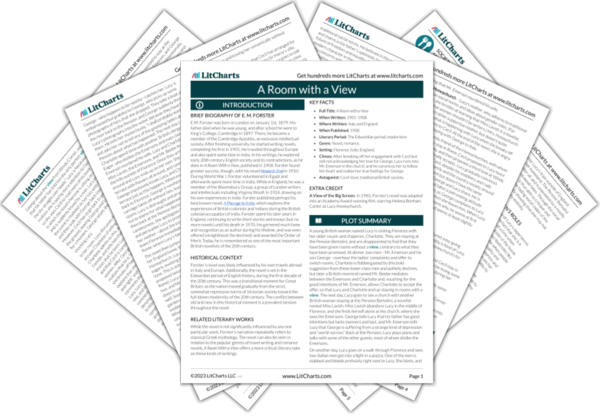Summary
Analysis
At the home of a family friend, Mrs. Butterworth, Lucy thinks about her awkward bow earlier, and how she wasn’t prepared to encounter George outside on such on occasion, where he greeted her “with the shout of the morning star.” Cecil is bored with talking to Mrs. Butterworth, and behaves difficultly. Back at home, Mrs. Honeychurch comments on how rude Cecil can be to people around Windy Corner, where “nothing appears to please him.”
Lucy can’t stop thinking about George, but doesn’t realize why she might be so interested in him. She associates him with the freedom and beauty of nature signified by the “shout of the morning star.” As Mrs. Honeychurch notes, Cecil is continually rude and snobbish toward those he deems lower-class than he.
Themes
Lucy tries to defend Cecil’s haughtiness, but can’t find the right words. She feels that “two civilizations had clashed,” Cecil’s London society and the Honeychurches’ country community. Lucy goes to change for dinner and stops to look out a window, where there is not much of a view. She runs into Freddy, who says that he wants to invite the Emersons to play tennis on the next Sunday.
The petty differences between London society and country society are magnified in Lucy’s mind to a great clash of civilizations. More constricted than ever by societal and familial expectations, as well as by Cecil, Lucy is not able to find much of a view onto the open outside world.
Themes
Lucy and Mrs. Honeychurch talk about the letter Lucy received from Charlotte. Mrs. Honeychurch asks about Charlotte’s boiler, which needed to be fixed. At dinner, Freddy asks Lucy about George, and Mrs. Honeychurch asks her how well she knew George in Florence. Lucy says that she didn’t really know him, and that Charlotte knew him better. Mrs. Honeychurch then asks what Charlotte talked about in her letter. Lucy simply says, “one thing and another,” trying hard not to lie.
Lucy’s changed perspective toward Charlotte shows how much she has grown and changed since Florence. Now, she doesn’t care for her cousin, and doesn’t want to talk about her letter. Charlotte’s broken boiler may symbolize her lack of passion. Lucy takes great care not to lie to her family, but is forced to omit the whole truth about her history with George and what Charlotte wrote her about.
Themes
Lucy says that Charlotte mentioned Miss Lavish, a novelist, knowing that this will cause Mrs. Honeychurch to go on about female writers. Indeed, her mother speaks at length about how, “if books must be written, let them be written by men.” Meanwhile, Lucy feels as though she is surrounded by the ghosts of her past, especially “the original ghost—that touch of lips on her cheek.” Mrs. Honeychurch suggests that they invite Charlotte to stay at Windy Corner, since her boiler is not working.
Mrs. Honeychurch holds traditional, sexist ideas about the proper place of a woman, showing that sexism in society can be upheld and enforced by women as well as men. Increasingly under pressure to lie and deceive her family, Lucy is overwhelmed by her past. She still does not acknowledge, or realize, though, why the memory of George’s kiss has such a hold on her.
Themes
Literary Devices
Get the entire A Room with a View LitChart as a printable PDF.

Lucy tries to think of an excuse not to invite Charlotte, saying there is no room for her. She admits that both she and Cecil don’t like Charlotte, and calls her “tiresome.” Mrs. Honeychurch chides them both for not taking pity on Charlotte, and says, “you are young, dears, and however clever young people are, and however many books they read, they will never guess what it feels like to grow old.” Lucy and Cecil finally relent.
In Florence, Lucy was mostly obedient toward Charlotte and fond of her. Now, she is more independent (though still under Cecil’s influence). Mrs. Honeychurch’s comment shows that the novel’s central tension between new and old ideas and values is also a tension between young and old people.
Themes












